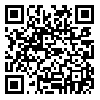Volume 4, Issue 4 (2024)
jpt 2024, 4(4): 301-312 |
Back to browse issues page
Download citation:
BibTeX | RIS | EndNote | Medlars | ProCite | Reference Manager | RefWorks
Send citation to:



BibTeX | RIS | EndNote | Medlars | ProCite | Reference Manager | RefWorks
Send citation to:
Abasi Hosseinabadi H. The Ontological Position of Intelligence in Kitab al-Alal. jpt 2024; 4 (4) :301-312
URL: http://jpt.modares.ac.ir/article-34-75843-en.html
URL: http://jpt.modares.ac.ir/article-34-75843-en.html
Department of Islamic Philosophy and Theosophy, Shahr-e-Ray Branch, Payam-e-Noor University, Shahr-e-Ray, Iran
Abstract: (2211 Views)
Kitab al-Alal explains the principles and first causes of things and discusses God. The issue of this article is the ontological position of intelligence in Kitab al-Alal. The question is, what is the ontological position of intelligence in Kitab al-Alal, and how can it be explained? Is it possible to assign the position of teleology to the perfection and happiness of man in the Book of Causes? In terms of existence, intelligence is the first creature and the closest being to the first cause, and it is in the second place after the first cause. The ontological effectiveness of intelligence is measured in two ways: planning, ruling, and creating. The act of intellection is the act of creation. In this article, to explain this issue and answer the questions descriptively and analytically, we will explain and analyze the chapters related to intelligence.
Article Type: Original Research |
Subject:
Epistemology (Medieval)
Received: 2024/08/28 | Accepted: 2024/12/10 | Published: 2024/12/21
Received: 2024/08/28 | Accepted: 2024/12/10 | Published: 2024/12/21
References
1. Aquinas T (1996). Commentary on the book of causes. Guagliardo VA, Hess CR, Taylor RC, Translators. Washington, DC: The Catholic University of America Press. [Link]
2. Aquinas T (1997). On being and essence. Miller RT, Translator. New York: Internet Medieval Sourcebook. [Link]
3. Badawi A (1977). AL-AYDAH FI AL-KHAIR AL-MAHD LE-ARISTOTLE. In: AL-AFLATUNIYYAH AL-MUHADITHAH ANDAL-ARAB. Kuwait: VEKALAT AL-MATBUAT. [Arabic] [Link]
4. Bertolacci A (2022). God's existence and essence: The liber de causis and school discussions in the metaphysics of Avicenna. In: Reading Proclus and the book of causes (Volume 3). Leiden: Brill. p. 251-280. [Link] [DOI:10.1163/9789004501331_012]
5. Brand DJ (1984). The book of causes. Milwaukee: Marquette University Press. [Link]
6. Calma D (2022). Reading Proclus and the book of causes (Volume 3). Leiden: BRILL. [Link] [DOI:10.1163/9789004501331]
7. Proclus (1971). The elements of theology: A revised text with translation, introduction and commentary. Dodds ER, editor. 2nd edition. Oxford: Clarendon Press. [Link]
8. Shahrzouri MIM (n.d.). The history of the sages before the advent of Islam and after "NUZHAT AL-ARVAH VA RUZAT AL-AFRAH". Paris: DAR BYBLION. [Arabic] [Link]
9. Taylor RC (1979). ST. Thomas and the liber de causis on the hlyomorphic composition of separate substances. Mediaeval Studies. 41:506-513. [Link] [DOI:10.1484/J.MS.2.306252]
| Rights and permissions | |
 |
This work is licensed under a Creative Commons Attribution-NonCommercial 4.0 International License. |






